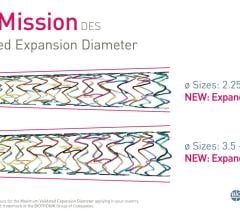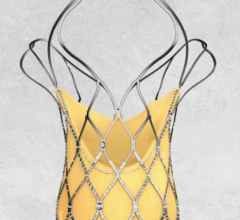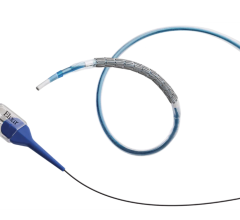December 4, 2007 - Patients treated with Abbott Laboratories Inc.’s experimental drug-coated heart stent had low rates of blood clots, heart attacks and cardiac-related deaths up to two years later, U.S. medical device reviewers said in documents released on Tuesday.
Food and Drug Administration (FDA) staff also said Abbott's Xience device had "favorable" outcomes on a key measure of effectiveness, when compared with Boston Scientific Corp's Taxus stent.
Heart-related deaths were comparable between Xience and Taxus after one year, the FDA staff said in a summary released ahead of an advisory panel review on Thursday.
Stents are tiny mesh tubes used to prop open arteries after doctors clear them of blockages. Some versions have a drug coating meant to keep the vessels from reclogging.
Blood clots that may develop in some patients months later, and potentially cause heart attacks, are a major concern with drug-coated stents. The market for the devices once stood at $6 billion a year but has dropped on concern over the clotting issue.
Abbott provided data to the FDA on a subset of 603 patients followed for two years. FDA reviewers said rates of blood clots, heart attacks, and heart-related deaths were "low," but cautioned that the analysis had several limitations.
For example, the cut-off date was chosen arbitrarily, and the data may not have included problems in patients who had not yet reached the two-year follow-up point.
Phil Nalbone, an analyst with RBC Capital, said the two-year data were impressive, although not a great surprise, and signal that Xience likely will become the best-selling U.S. stent about a year after approval. The product is already sold overseas.
"Xience after two years continues to show the robust superiority to Taxus that we learned about in March, when most of the data only went out to nine months," Nalbone said.
"We think it will dominate the U.S. market after about a year, capturing over one-third (of market share) and will ultimately claim at least 40% of the market," Nalbone said.
"It will be a multibillion-dollar product and support Abbott's future earnings," he said.
A panel of experts from outside the FDA is expected to decide on Thursday whether to recommend Xience for approval. The FDA usually follows panel recommendations.
JP Morgan analyst Michael Weinstein, in a note to clients, said the chance of a positive panel vote was 60 percent. He said it was "by no means a slam-dunk" as data beyond one year remained "limited" and panel members could decide more is needed.
At the moment, Johnson & Johnson's Cypher and Boston Scientific's Taxus are the only two U.S.-approved drug-coated stents. Abbott and Medtronic Inc, with its Endeavor stent, are seeking to join the field.
Abbott has said it expects to launch Xience in the first half of 2008 if the product wins FDA clearance.
In a statement issued on Tuesday, Abbott Executive Vice President John Capek said Xience was "the only drug-eluting stent that has demonstrated clinical superiority over another drug-eluting stent in a randomized clinical trial."
In October, an FDA advisory panel unanimously urged approval for Medtronic's Endeavor stent. A final decision is pending.
Abbott shares rose 3.2 percent to $55.97 in afternoon trading on the New York Stock Exchange.
Source: Lisa Richwine, Reuters Health, November 28, 2007
For more information: www.abbottvascular.com


 July 02, 2024
July 02, 2024 









